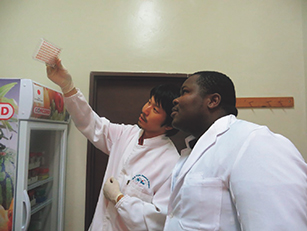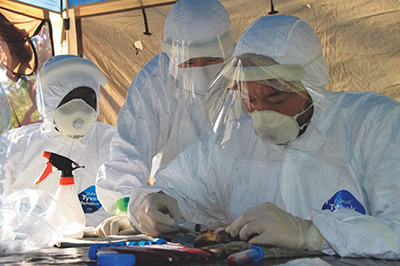Master Techniques from Japan to the World 4
Preparing for Unknown Infectious Diseases in Africa!
—Joint research on zoonotic virus infections between Hokkaido University and the University of Zambia—

Checking the presence of a virus (Photo: Hokkaido University)

Dr. Takada and UNZA-SVM researchers collecting blood from a bat in the field (Photo: Hokkaido University)
Zoonoses caused by viruses that infect both humans and animals, such as COVID-19 and Ebola virus disease, have become a global threat in recent years. Outbreaks of viral zoonoses have also been confirmed in Zambia. It has become a priority for the country to control them. Furthermore, it is highly possible that yet unidentified viruses exist in Africa, and research projects on such novel viruses are now attracting attention not only in Africa, but also on a global scale.
Under those circumstances, the “Project for Surveillance of Viral Zoonosis in Africa” was carried out in Zambia from 2013 as a joint research by Hokkaido University and School of Veterinary Medicine, the University of Zambia (UNZA-SVM) under the Science and Technology Research Partnership for Sustainable Development (SATREPS)* program. Additionally, a succeeding project, the “Project for Epidemiology of Zoonotic Virus Infections in Africa,” is being implemented since 2019.
The first step in these two projects was the construction of a virology laboratory with an animal facility to improve the research environment at UNZA-SVM, which had almost no infrastructure for education and research on viral zoonoses. Additionally, diagnostic methods for viral zoonoses such as viral hemorrhagic fever were introduced to the researchers of UNZA-SVM.
Dr. TAKADA Ayato at the Research Center for Zoonosis Control (CZC), Hokkaido University, explained as follows. “This project began thanks to the long-standing close ties between Hokkaido University and UNZA. A school of veterinary medicine was established at UNZA with the cooperation of Japan about 30 years ago. Then, Hokkaido University’s faculty members visited Zambia to train people from scratch and help UNZA to establish a veterinary school. This was the beginning of the exchange between the two universities. Later, our cooperative relationship was further strengthened, as CZC was established at Hokkaido University and a joint project with UNZA was launched.” Dr. TAKADA is acting as a central figure in this project.
The Democratic Republic of the Congo (DRC), Zambia’s neighboring country, has also joined in the succeeding project which started in 2019, handling not only samples of animals such as arthropods, but also those of humans. The project is intended to strengthen the epidemiological research capacity of the research institutions in the two countries and improve their diagnostic capabilities. This project and the preceding project from 2013 have already discovered various viruses in Zambia. In the DRC, it is expected that the project might contribute to early detection and enhancement of measures against Ebola virus disease, of which there have been several outbreaks in the country since 2017.
Hokkaido University has been accepting students from Zambia and the DRC. The University has been carrying out programs for training them to create experts on zoonosis control. UNZA-SVM has conducted more than 60,000 specimen tests in response to the COVID-19 pandemic. Those who studied at Hokkaido University and came back to their countries are active as core personnel in combatting COVID-19.
Dr. KAJIHARA Masahiro, a faculty member working with Dr. Takada at CZC, expressed his hope for Zambia as follows. “It was hard to train veterinarians in Zambia before; however, they are doing it now. Zambia is even accepting graduate students from other African countries and is becoming a center for veterinary research in Africa.”
Longstanding academic cooperation between Japan and Africa is about to bring about great strides in measures against infectious diseases, a transborder issue, with a view to preparing for infectious diseases in the future.
*See the Glossary.
<< Previous Page
Main Text | Reference Statistics | Reference Materials | Stories from the Field | Master Techniques from Japan to the World | ODA Topics
